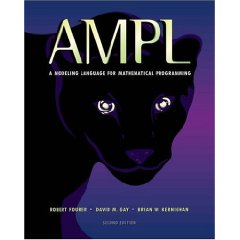Related Research Articles
OPL may stand for:
In artificial intelligence and operations research, constraint satisfaction is the process of finding a solution through a set of constraints that impose conditions that the variables must satisfy. A solution is therefore an assignment of values to the variables that satisfies all constraints—that is, a point in the feasible region.

AMPL is an algebraic modeling language to describe and solve high-complexity problems for large-scale mathematical computing . It was developed by Robert Fourer, David Gay, and Brian Kernighan at Bell Laboratories. AMPL supports dozens of solvers, both open source and commercial software, including CBC, CPLEX, FortMP, MOSEK, MINOS, IPOPT, SNOPT, KNITRO, and LGO. Problems are passed to solvers as nl files. AMPL is used by more than 100 corporate clients, and by government agencies and academic institutions.
IBM ILOG CPLEX Optimization Studio is an optimization software package.
The general algebraic modeling system (GAMS) is a high-level modeling system for mathematical optimization. GAMS is designed for modeling and solving linear, nonlinear, and mixed-integer optimization problems. The system is tailored for complex, large-scale modeling applications and allows the user to build large maintainable models that can be adapted to new situations. The system is available for use on various computer platforms. Models are portable from one platform to another.
MPS is a file format for presenting and archiving linear programming (LP) and mixed integer programming problems.
CHIP is a constraint logic programming language developed by M. Dincbas, Pascal Van Hentenryck and colleagues in 1985 at the European Computer-Industry Research Centre (ECRC), initially using a Prolog language interface. It was the first programming language to implement constraint programming over finite domains, and subsequently to introduce the concept of global constraints.
Minion is a solver for constraint satisfaction problems. Unlike constraint programming toolkits, which expect users to write programs in a traditional programming language like C++, Java or Prolog, Minion takes a text file which specifies the problem, and solves using only this. This makes using Minion much simpler, at the cost of much less customization.
In discrete optimization, a special ordered set (SOS) is an ordered set of variables used as an additional way to specify integrality conditions in an optimization model. Special order sets are basically a device or tool used in branch and bound methods for branching on sets of variables, rather than individual variables, as in ordinary mixed integer programming. Knowing that a variable is part of a set and that it is ordered gives the branch and bound algorithm a more intelligent way to face the optimization problem, helping to speed up the search procedure. The members of a special ordered set individually may be continuous or discrete variables in any combination. However, even when all the members are themselves continuous, a model containing one or more special ordered sets becomes a discrete optimization problem requiring a mixed integer optimizer for its solution.

Computational Infrastructure for Operations Research (COIN-OR), is a project that aims to "create for mathematical software what the open literature is for mathematical theory." The open literature provides the operations research (OR) community with a peer-review process and an archive. Papers in operations research journals on mathematical theory often contain supporting numerical results from computational studies. The software implementations, models, and data used to produce the numerical results are typically not published. The status quo impeded researchers needing to reproduce computational results, make fair comparisons, and extend the state of the art.
The TOMLAB Optimization Environment is a modeling platform for solving applied optimization problems in MATLAB.
Algebraic modeling languages (AML) are high-level computer programming languages for describing and solving high complexity problems for large scale mathematical computation. One particular advantage of some algebraic modeling languages like AIMMS, AMPL, GAMS, Gekko, MathProg, Mosel, and OPL is the similarity of their syntax to the mathematical notation of optimization problems. This allows for a very concise and readable definition of problems in the domain of optimization, which is supported by certain language elements like sets, indices, algebraic expressions, powerful sparse index and data handling variables, constraints with arbitrary names. The algebraic formulation of a model does not contain any hints how to process it.
LEMON is an open source graph library written in the C++ language providing implementations of common data structures and algorithms with focus on combinatorial optimization tasks connected mainly with graphs and networks. The library is part of the COIN-OR project.

ILOG S.A. was an international software company purchased and incorporated into IBM announced in January, 2009. It created enterprise software products for supply chain, business rule management, visualization and optimization. The main product line for Business Rules Management Systems (BRMS) has been rebranded as IBM Operational Decision Management. Many of the related components retain the ILOG brand as a part of their name.
OptimJ is an extension for Java with language support for writing optimization models and abstractions for bulk data processing. The extensions and the proprietary product implementing the extensions were developed by Ateji which went out of business in September 2011. OptimJ aims at providing a clear and concise algebraic notation for optimization modeling, removing compatibility barriers between optimization modeling and application programming tools, and bringing software engineering techniques such as object-orientation and modern IDE support to optimization experts.
AIMMS is a prescriptive analytics software company with offices in the Netherlands, United States, and Singapore.

Pyomo is a collection of Python software packages for formulating optimization models.

Robert E. Bixby is an American mathematician, the Noah Harding Professor Emeritus of Computational and Applied Mathematics at Rice University.

Google OR-Tools is a free and open-source software suite developed by Google for solving linear programming (LP), mixed integer programming (MIP), constraint programming (CP), vehicle routing (VRP), and related optimization problems.
References
- ↑ Kevin Ruland (September 1999). "The OPL Optimization Programming Language". INFORMS Journal on Applied Analytics . 29 (5): 148–149. ISSN 0092-2102. Wikidata Q124605115.